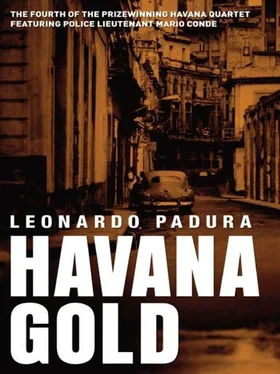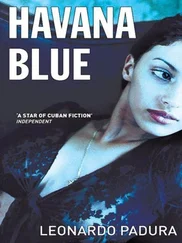“Ay, my love, I’ve been sitting here for two days. Look who the historic figure was,” she said, pointing her chin at the screen. “Chorizo the clown. That’s an insult to those clever professors who know so much.”
Before leaving, the Count kissed her forehead and said he’d soon be back – with more rum.
He stopped on the corner of the street and hesitated. To his left bars summoned, and to his right Karina’s place. There was only a lorry parked in front of the whole block and he raised his hopes thinking a Polish Fiat might be lurking behind it. He turned right, passed by the girl’s house that was still shut up and saw there was nothing behind the lorry. He walked to the corner, turned half round and walked back past her house. He wanted to go in, ring, ask – I’m a policeman, for fuck’s sake, where’s she got to? – but a last ounce of pride and commonsense repressed his adolescent impulse when he put his hand on the garden gate. He walked on down the street, after rum and oblivion.
“Well, pal, she didn’t ring,” he managed to say with enough strength to raise his arm and drink some more. The second bottle of firewater was also practically dead when the National Anthem blared out to mark the end of the evening’s programmes.
Josefina stood in the doorway, observed the hecatomb and crossed herself mechanically: the two were shirtless, and gripping their glasses tight. Her son, slumped over the arm of his wheelchair, his flabby flesh streaming with sweaty. And the Count, sitting on the floor, back against the bed, suffering the last rattle from a coughing attack. On the ground, an ashtray steaming like a volcano and the corpses of two bottles and the epilogue to another.
“You’re killing yourselves,” she said picking up the bottle of firewater. She fled. Those scenes filled her heart with sadness because she knew she spoke the truth: they were committing suicide, cowardly but surely. And only love and loyalty remained from the times when Skinny and the Count spent their evenings and nights in that same room, listening to music at a superhuman volume and arguing about girls and baseball.
“She didn’t ring. I’m going for fuck’s sake.”
“Are you mad? How can you go in that state?”
“Not dragging my bum across the floor. Walking,” and he made an unlikely effort to revert to the vertical. He failed twice, but succeeded at the third attempt.
“Are you really leaving?”
“Yes, you beast, I’m throwing myself out. I’ll die like a stray dog. Just remember one thing: I fucking love you to death. You’re my brother, friend and you’re my skinny little pal,” he said and, abandoning his glass on the night table, he hugged his pal’s sweaty head and gave his hair a slobbering kiss, while Skinny’s massive hands gripped the arms that hugged him as the kiss turned into a hoarse, sickly sob.
“Hell, brother, don’t cry… Nobody deserves your tears. Castrate Fabricio, kill her, forget Jorrín, but don’t cry, otherwise I’ll cry too.”
“Cry then, you bastard. I can’t stop myself.”
The wind blew from the south, bringing the smell of withered flowers and burnt oil, the effluvia of deaths from yesteryear and yesterday, as cars and buses halted in the cemetery’s main avenue. The funeral car had driven a few yards on to allow the mourners to show off their years of experience and form an improvised, disciplined queue, without numbers or fear of being left empty-handed, ready to follow the coffin to its final resting-place. The queue was headed by Jorrín’s wife and two children who the Count didn’t know, then Major Rangel and other high-ranking officers, all wearing uniforms and stripes. It was far too sad a spectacle for the Count’s tender sensitivities: his head, liver, heart and soul hurt; and when they were level with the cemetery’s main chapel, he told Manolo, “Go on, I’ll catch you up,” and he separated out from the procession that advanced like a sleepy snake. The sun was hurting Conde’s eyes, breached his sunglasses, and he sought out the shadow of a weeping willow and sat down on one side of the pavement. He was one of the few officers who hadn’t come to the ceremony in full uniform and he changed the angle of his pistol as he flopped on the low wall. The silence in the cemetery was intense and the Count was grateful. He had enough noises inside himself and declined to listen to the more or less predictable eulogy that would wind up the mourning for Captain Jorrín. A good father, good policeman, and good colleague? You don’t come to a cemetery to learn what you already know. He lit a cigarette and, the other side of the chapel, saw a group of women changing the flowers on a grave and dusting the gravestone. It seemed a social rather than meditative act and the Count remembered he’d been told about the existence of a Miraculous One, in that cemetery, and that people often came to ask for mysterious help from her understanding spirit that was in step with the times. He stood up and went over to the women. Three sat on a bench next to the grave and two were still cleaning briskly, sweeping up leaves and earth left by the wind, re-arranging bunches of flowers in the earthenware jugs. All wore black scarves round their heads, dressed like timeless Spanish village women, swapping more or less accurate rumours about up-and-coming reductions in the weekly egg quota price increases. Without asking their permission the Count sat on the bench next to the women and looked at the grave and the flowers, candles, black rosary beads and blurred picture of a woman behind a glass frame.
“She’s the Miraculous One, isn’t she?” the policeman asked the nearest woman.
“Yes, sir.”
“And you look after the grave?”
“It’s our turn once a month. We clean and tidy it and help people who come to ask for something.”
“I want to ask for something,” the Count replied.
He didn’t look like a pilgrim, so the woman, a black woman well into her sixties with arms of soft ham, looked at him for a second before she spoke.
“She’s given lots of evidence of her power. And one day the Church will recognize her for what she is: a miracleworking saint, a creature beloved of the Lord. If you can bring her flowers, candles, things like that, it helps when you ask, because it lights up her path, but all you really need is faith, lots of faith, and then you ask her for help and say a prayer. An Our Father, a Hail Mary, whatever you prefer. And ask from the bottom of your heart, with lots of faith. You understand?”
The Count nodded and remembered Jorrín. They must be saying goodbye to him now; no doubt the Boss, a companion of thirty years standing, would speak of his record of unstinting service to society, family and life. Then he looked at the grave opposite and tried to recall a prayer. If he was going to ask for something, he’d do it properly, trying to recover the scattered bits of the faith he’d reneged on, but he didn’t make it past the first lines of the Lord’s Prayer that he confused with fragments of Mario Benedetti’s Lord’s Prayer for Latin America – that had become so popular during his time at university, when an urgent Latin Americanization of Cuban culture was decreed and strident rock groups transformed into pathetic, chameleon-like adepts of Andean and Altiplano folklore, panpipes, tambourines and ponchos included, and some even sang in Quechua and Aymara rather than Spanish. But now faith was what was crucial. Which faith? I’m atheist, but I have faith. In what? In almost nothing. Too much of a pessimist to have space for faith. But you’ll help me, Miraculous One, won’t you? Huh-huh. I’ll only ask for one thing, though it’s a very big one, and as you work miracles, you’ll help me, because I need a miracle as big as this cemetery to get what I want, you understand?… I hope so and that you’re hearing me: I want to be happy. Is that so much to ask for? I hope not, but don’t forget, Miraculous One, all right?
Читать дальше











